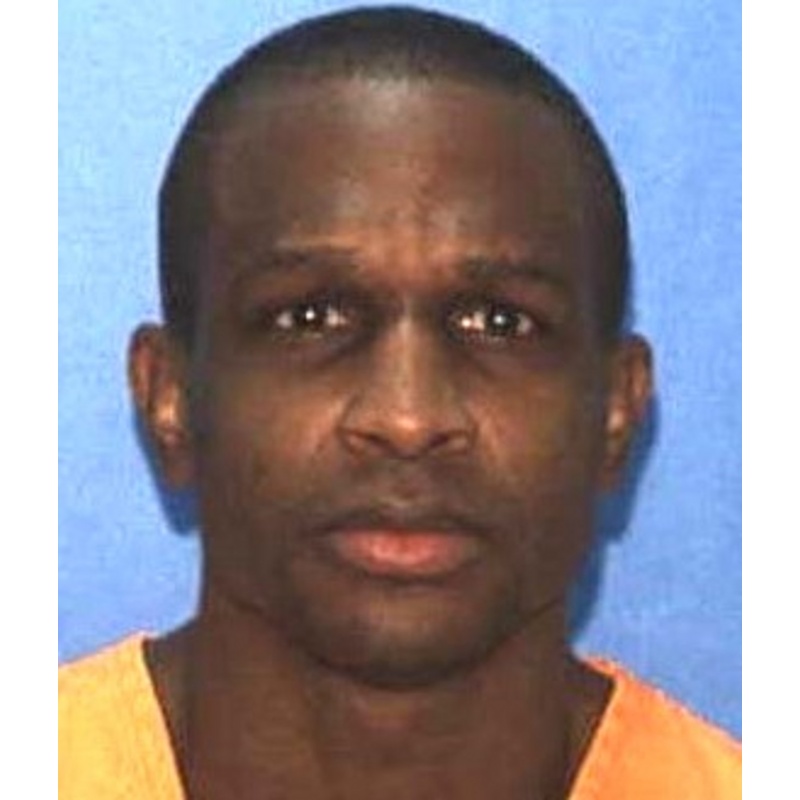JASON DEMETRIUS STEPHENS | Florida Death Row | Sentenced To Death For The Murder Of A Three Year Old Boy | Asked Authorities To Help Him Get The Electric Chair | ALS
LongfellowSerenade 27
Jason Demetrius Stephens was sentenced to death by the State of Florida for the murder of a three year old boy. According to court documents Jason Stephens and a number of accomplices would enter a home and soon it turned into a robbery. After all of the hostages were contained Jason Stephens and his accomplices would rob the home along with the three year old boy. Jason Stephens would strangle the three year old boy Robert Sparrow III causing his death. Jason Stephens would be arrested, convicted and sentenced to death.
$20.00
- Postage
-
$0.00 to United States
Standard Shipping
Get Additional Rates
- Select Country
- Zip/Post Code
- Quantity
Description
J. d. Stephens. Autographed Letter, Signed. Handwritten, Commercial #10 (4.125 × 9.5 envelope). Raiford, FL. Pmk: September 18, 2023. Content unknown. SEALED.
Classification: Murderer
Characteristics: Robbery - Drugs - Kidnapping
Number of victims: 2
Date of murders: June 18, 1996 / June 2, 1997
Date of birth: March 8, 1974
Victims profile: Robert Miller / Robert Sparrow III, 3
Method of murder: Shooting / Asphyxiation
Location: Duval County, Florida, USA
Status: Sentenced to death on April 7, 1998
The overwhelming
evidence of guilt in this case shows Jason
Demetrius Stephens (b. March 8, 1974 | age 49) broke into
Robert Sparrow, Jr.’s house on June 2, 1997, at approximately 2
p.m., while a number of people were present. He robbed the people
there and kidnapped a child. There were three or four other people
with Stephens at the time he committed these crimes. However,
Stephens refused to cooperate with the authorities in their efforts
to identify the other individuals. One of the individuals, Horace
Cummings (“Cummings”), turned himself into the police and was
tried with Stephens. The other two individuals were never
apprehended. Stephens testified at trial that Cummings and the other
unidentified individuals went to the house to buy drugs and were
unaware of his plan to rob the occupants.
There were eight eyewitnesses in the house who testified at trial. While some of the details of the eyewitness’ accounts varied, they all substantially agreed with the following summary of events. Stephens entered the house first, carrying a nine millimeter automatic gun. He was standing next to Robert Sparrow, III (“Sparrow III”), who was three years and four months old. Upon seeing the gun, the child’s mother, Consuelo Brown, physically confronted Stephens. Stephens hit her with the gun on the bridge of her nose. Ms. Brown fell to the ground and her nose began to bleed. Stephens ejected a bullet onto the floor and informed the occupants that the gun was loaded. He told them that he wanted “money and weed.” He demanded from Robert Sparrow, Jr. (“Sparrow Jr.”) the keys to a blue car located outside the house. Sparrow Jr. told Stephens the keys were with someone who was not present at the house.
Thereafter, two other individuals entered the house. One of the individuals was Cummings, but the other individual was never identified. Stephens made all the occupants lie down on the floor as he searched their pockets for valuables. The unidentified individual, referred to as Plats or Dreds because of the way he wore his hair, held the occupants of the house on the floor at gunpoint while Stephens located a secured room where he could put them. There was some testimony that Sparrow III said he was being choked, but it was unclear from the record who was choking him. After inspecting the house, Stephens determined the bathroom was the most secure location to put his hostages, and he ordered six of them, including six-year-old Kahari Graham, to crawl to the bathroom. Sparrow III was kept separate from the others.
Many of the eyewitnesses testified that Stephens showed his ID and said he was taking Sparrow III with him as insurance. Sparrow Jr. testified Stephens agreed he would leave the child at the corner if he was not followed. Stephens also testified he agreed to leave the child somewhere, but he did not know what location the child’s father had referred to in his testimony.
After the occupants had been secured in the bathroom, Sparrow Jr.’s half-brother, David Cobb (“Cobb”), and his friend, Roderick Gardner (“Gardner”), arrived at the house. Upon entry, they too were robbed and forced to crawl to the bathroom. One of the items Stephens took from Gardner was his car keys. Gardner was driving his mother’s dark green Kia, which had roll-down windows and pull-up locks. There was testimony that Sparrow III had ridden in the Kia the day before he was killed. On that day, he had been scolded for rolling down the windows and trying to open the car door while it was moving. The record did not reflect that Stephens had any way of knowing whether the child was capable of rolling down the windows or opening the car door.
When Stephens exited the house with the child, the other individuals who Stephens testified had only gone to the house to buy drugs, were seated in the black car they had driven to the scene. Stephens testified the other individuals waved him away from the black car because he had the child. Stephens then ordered the boy to get into the Kia. Both cars pulled away from the house, with the Kia following the black car. After driving eight tenths of a mile, both cars pulled over in a residential neighborhood. It was approximately 2:30 p.m. The Kia was parked on the side of the street without the benefit of any shade. The outside temperature was approximately 82 degrees and sunny. The windows in the car were rolled up and all of the doors were closed. At 9:25 p.m., the dark green Kia was found. Sparrow III was dead, his body lying face down in the passenger’s seat with his feet angled toward the steering wheel. The State argued Stephens suffocated Sparrow III before leaving the car. Stephens testified the boy was alive when he left him in the car.
The medical examiner, Bonifacio Floro, M.D., testified that in his expert medical opinion Robert Sparrow, III had probably died of asphyxiation. However, he could not conclusively rule out hyperthermia as the cause of death. He primarily relied upon multiple “petechiae” in the face and eye lining as an indication of asphyxiation. He also noted there was a small four-millimeter scratch on the back of the child’s neck. Dr. Floro concluded this scratch was probably caused by a fingernail. Dr. Floro testified the child’s lower lip was bruised, indicating he had been suffocated. Dr. Floro also relied upon the lack of fingerprints or other evidence showing the child tried to roll down the window or open the door in concluding it was more likely that Sparrow III died from asphyxiation than hyperthermia.
Steven Frank Dunton, M.D., testified on the defendant’s behalf. After reviewing Dr. Floro’s report, he concluded Sparrow III died from hyperthermia. Dr. Dunton relied upon the fact that there were very few signs of asphyxiation. However, he did admit asphyxiation can never be conclusively ruled out because it can leave no signs at autopsy. Dr. Dunton admitted hyperthermia by itself should not cause petechiae, whereas asphyxiation could. However, he went on to explain that gravity will pull the blood down to the lowest point of the body when the heart stops pumping, causing the blood to pool to such a degree that venules rupture resulting in petechiae. He attributed the discoloration of the child’s lips to the tissues drying out after death. Therefore, he concluded Dr. Floro erred in relying on the petechiae to diagnose the child’s death as being caused by asphyxiation.
Based upon these facts the jury concluded Stephens was guilty of first-degree murder. The verdict form did not delineate between first-degree premeditated murder and first-degree felony murder.i
Archiving Protocol:
• Handled with White Gloves ab initio
• Photo Pages/Sheet Protectors: Heavyweight Clear Sheet Protectors, Acid Free & Archival Safe, 8.5 × 11, Top Load
• White Backing Board—Acid Free
Shipping/Packaging: Rigid Mailer 9.5 × 12.5. White, self seal, stay flat, kraft cardboard, no bend. Each rigid mailer is made of heavy cardboard, which has strong resistance to bending and tearing. Thicker that the USPS mailers. Shipping cost never more than it absolutely has to be to get it from me to you.
Payments & Returns
- Payment Methods
- PayPal, Money Order
Postage & Shipping
- Item Location
- 54911, Wisconsin, United States
- Ships To
- Worldwide
- Pick-ups
- No pick-ups
- Returns Accepted
- No







